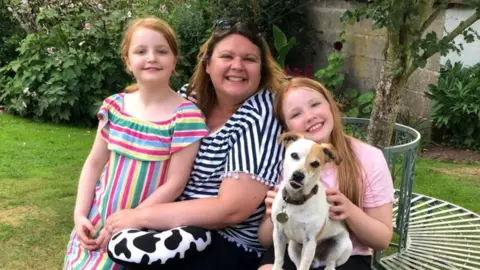‘It’s really hard to progress when working part-time’
 Helen Cholmeley
Helen Cholmeley"I am sure 'mum guilt' will be familiar to many parents. Guilt that you are not spending enough time with your family and that you are not giving 100% at work," says HR professional Helen Cholmeley.
The mum-of-two from Newbury has been juggling part-time work with looking after her daughters for the past decade.
Last year, she decided it was time to move on from her previous job at a telecommunications company. But few part-time roles were being advertised, she says.
"It's really hard to progress when you're part-time. If you look at any internal jobs boards, you'll rarely find any part-time roles. I felt it hindered my career and I decided it was time for a change."
Eventually, she spotted a new flexible role at the insurance firm Zurich. The company, which employs 4,500 in the UK, began advertising part-time, job share or flexible options in all job vacancies last year.
"In my first week, my daughter had to have an emergency dentist appointment. I didn't need to worry. I could take the time to be with my daughter without fear.
"Flexibility removes that feeling [of guilt]. I can be a mum and a technology consultant."
A new a government-backed study for Zurich insurance suggests that women like Helen are 20% more likely to apply for senior roles if they offer flexible hours.
Using gender-neutral language in job adverts also generated "significant change", it found.
The research - which was carried out by the Behavioural Insights Team, a government-backed think tank - found women have struggled to progress in their careers at Zurich in the past.
It found there had been a lack of applications from women for senior roles, many of which had not been available on a flexible basis.
Female employees reported this had made them less likely to apply.
"We've seen hugely encouraging results, simply by adding six words to our job adverts [offering flexible working arrangements]," said Steve Collinson, Zurich's head of HR.
"By offering roles that fit flexibly around family life, employers could open the floodgates to a much wider pool of untapped talent.
"This will also help women progress into higher paid jobs whilst fitting other commitments around their careers," he added.
Since changing its policy on job adverts, the number of women hired for top roles has risen by 33%, it says.
 Getty Images
Getty ImagesAlison Martin, the boss of Zurich's Europe, Middle East and Africa division, told the BBC's Today programme that the move was also necessary to tackle the firm's gender pay gap - the percentage difference between average hourly earnings for men and women.
"We thought this was probably one of the underlying reasons why we have a gender pay gap. It was just over 20% when we last published it, and that's simply too high."
"So we tried to make sure there were as many opportunities for [women] because, let's face it, the best thing you can do as a company is have a diverse and inclusive workforce."
'Just as important to men'
According to the research, women are more likely to have caring responsibilities and may struggle to progress into more senior roles if they do not offer flexible working options. Some even end up leaving the labour market.
The study, which looked at Zurich job vacancies between March 2019 and February 2020, found many more men also applied for roles when they offered flexible working options, suggesting the issue was "just as important" for them.
Existing part-time employees also reported a stronger sense of "belonging" due to the shift, pointing to the fear some workers have of being judged for not working full-time.
Minister for Women Baroness Berridge said: "The benefits of flexible working have really been emphasised during recent months.
"We want to see more employers embracing practices such as working from home and returners programmes, which can have a positive impact for both men and women."
